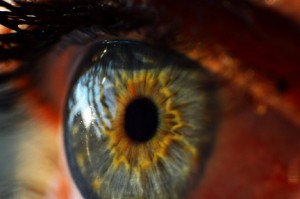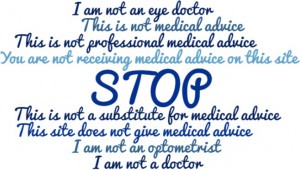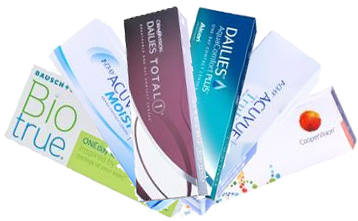Since I get this question a lot, in this post I will provide some advice on how long you should be wearing your contact lenses. The answer to this question of course depends on a lot of things, but assuming that you wear daily wear contact lenses (i.e., not contact lenses that you sleep with), and that you have generally healthy eyes (i.e., don’t suffer from severe dry eye, allergic conjunctivitis, blepharitis, SPK, GPC, etc., etc.), then this will serve as a good general guideline.
I am not a doctor and this article is not a substitute for professional medical advice. You are not being prescribed contact lenses on this page. Please read Contacts Advice Terms of Use before continuing.
Why should you limit your wearing time?
Contact lenses are not a natural part of the eye! They are an extra layer of plastic covering the cornea which can lead to several changes over time. The main change that contact lenses induce while you’re wearing them is that less oxygen reaches the surface of your eye. This is called hypoxia.
Corneal Physiology 101
 Here’s a little physiology background about your cornea. Your cornea is a clear, transparent living tissue, and like every other living tissue in your body, it requires oxygen to function properly. In most body parts oxygen is delivered to our organs via blood. Veins and arteries carry blood (which carries oxygen) from our heart and lungs to every organ in our body and then back again. The cornea (the part of the eye that is covered by your contact lens) however, is an exception. The cornea does not receive oxygen from blood. It cannot because there are not blood vessels within it. Our vision would not be very clear if our corneas had veins and arteries running through them. Rather, the cornea gets its oxygen directly from the air by a process called diffusion.
Here’s a little physiology background about your cornea. Your cornea is a clear, transparent living tissue, and like every other living tissue in your body, it requires oxygen to function properly. In most body parts oxygen is delivered to our organs via blood. Veins and arteries carry blood (which carries oxygen) from our heart and lungs to every organ in our body and then back again. The cornea (the part of the eye that is covered by your contact lens) however, is an exception. The cornea does not receive oxygen from blood. It cannot because there are not blood vessels within it. Our vision would not be very clear if our corneas had veins and arteries running through them. Rather, the cornea gets its oxygen directly from the air by a process called diffusion.
The effect of contact lenses on oxygen transmission to the cornea
You guessed it. Since the cornea gets its oxygen from the air, and contact lenses cover the cornea, contact lenses reduce the amount of oxygen reaching the cornea! That’s why you should limit the number of hours you wear contact lenses throughout the day. There is another activity that we all do which induces corneal hypoxia. And that activity is sleeping. Yes, when we sleep our eyes are closed. If the eyes are closed the corneas are not exposed to the oxygen in the air. Night time hypoxia is natural for the cornea and does not lead to harm, but if you have a full day’s worth of contact lens wear, then go right to sleep, your eyes are never receiving the proper amount of oxygen. Over time this will lead to complications.
Not all contact lenses allow the same amount of oxygen through them
Contact lenses don’t completely block all of the oxygen from passing through them. They let some oxygen through, but some brands are much better at this than others. Brands that use the materials called silicone hydrogel, as oppose to conventional hydrogel, allow MUCH more oxygen to reach your eye. That’s why these are generally better for you. Luckily, all new monthly and bi-weekly lenses, and certain daily lenses are now made with silicone hydrogel. But even silicone hydrogel lenses have limitations and shouldn’t be worn all day long.
Brands that utilize silicone hydrogel:
- Acuvue Oasys, Acuvue Oasys for Astigmatism, Acuvue Oasys for Presbyopia
- Acuvue TruEye
- Air Optix, Air Optix for Astigmatism, Air Optix Color, Air Optix Multifocal
- Dailies TOTAL1
- Biofinity, Biofinity Toric, Biofinity Multifocal
- PureVision2, PureVision2 Toric for Astigmatism, PureVision2 Multifocal
 So how long should I be wearing them?
So how long should I be wearing them?
In general, it is recommended to limit wear to 12 hours or less per day, and 6 days or less per week. Wearing a silicone hydrogel lens or a daily wear lens helps to prevent complications for people who need to wear their contact lenses for long hours.
Remember that if you have begin to have discomfort at any time with the contact lenses you should consider removing them. If the discomfort is consistent, consider reducing your wearing time, or upgrading to a high quality lens. There are specific eye drops available that can prolong the comfort throughout the day if necessary. And don’t be afraid to see your optometrist for any contact lens related problems.
I hope you found this information helpful! For a full description of different contact lens brands you can check out my product information page.





8 Responses
Jason
Hello Julie,
I have found this website to be very informative and well researched. I learned so much just by reading your post. I didn’t know so much about the cornea until I read this. It is a world of great information! Do continue to share, I am looking forward for more posts from you.
Best,
Jason.
Julie
Hey Jason! I’m glad you learned something from my content! That gives me motivation to keep writing. Thanks!
tinnakon
I appreciate your knowledge given here. The information is clearly understood and make it easy for me to the choose the contact lenses. It is funny to tell you that most of the marker for contact lenses in Asia is for fashion such as big eyes or colored eyes which is very popular among the teenager.
Julie
Hi Tinnakon! Yes, although I am not as familiar with those cosmetic contact lenses, I see how popular they have become among young people. I should learn more about them. Thanks for sharing!
Ty Jord
I had a friend who developed a serious eye infection possibly as a result of improper use of her contact lenses which led to a fungus.
This is great advice you’ve posted and I would recommend to everyone wearing after seeing what happened to my friend. Because clearly you can never be too careful when it comes to the protection of your eyes.
Julie
Hi Ty Jord, I’m sorry to hear about your friend. Hopefully his story can help prevent others from going through the same thing. Thanks for sharing :)
Joan
Hi Julie – came across your site at the right time. Just had an eye exam this morning. I am learning more things about the eyes, but I am very happy to report that my eyes are in good health. I only wear contacts part time and i use the dailies.
thanks for your information,
Joan
Julie
Hi Joan! I’m so glad to hear that your eyes are healthy! That is the most important thing, always! It’s great that you enjoy learning about the eyes. If you have any questions about the eyes (not just contact lenses) I’d be more than happy to give you my take on it :)
Thanks for reading!
Julie